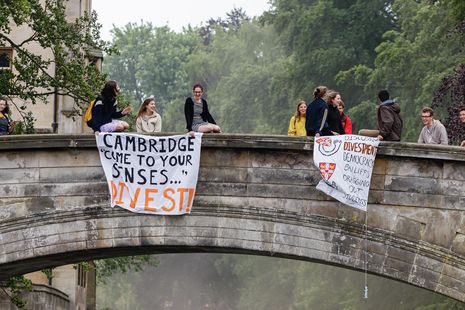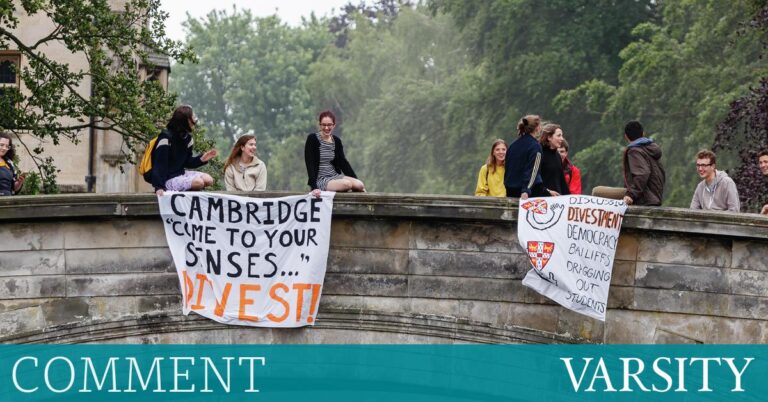
The grassroots movement is a testament to the power of student voices united behind a common purpose.Lewis Ashworth, with permission from Varsity
Besides the great social life, one of the things that attracted me to Cambridge was its political climate. As a politics student applying to the university, I was hoping to build on the activist work I was doing locally. From the prestigious Cambridge Union to the myriad university-related political organisations, these groups have provided a space for lively debate and intellectual discourse. However, after attending some of these organisations a few times, an unfortunate truth became apparent: despite the lively debate and intellectual posturing, they were more like echo chambers than engines of change. What we should be focusing on are the grassroots student movements that are ushering in the real social change that we (at least I) want to see.
Cambridge has seen many examples of student organising throughout its history, including a massive demonstration outside the Cambridge Union in November 1968 against Enoch Powell’s controversial comments on immigration. Similarly, in February 1969, the Cambridge University South African Committee mobilised 200 activists to protest against plans for Trinity College to tour South Africa. Episodes like these remind us of what student activism at Cambridge is like.
“It is puzzling to sit in posh rooms in Cambridge sipping port and discussing issues that affect people’s lives so deeply as if they were a matter of distant interest.”
But it is vital not to romanticize the university as a force for social change. Cambridge has a dark history, including alumni involvement in slave plantations in the Americas and, more recently, university investment in arms manufacturers and corporate funding of the Gaza conflict. My point is that there have been many moments when the university community has come together and demonstrated the potential for impactful collective action. I would like to see more of that genuine solidarity and less of the empty armchair rhetoric. It is puzzling to sit in posh Cambridge rooms sipping port and discussing issues that deeply affect people’s lives as if they were distant curiosities.
It’s fun once or twice to enjoy what are essentially all-you-can-drink sessions at Cambridge political groups, but how many times can you go through the New Labour debates? It gets a little boring. The repetitive nature of these groups tends to obscure the activist community I was looking for when I arrived.
Moreover, these societies can also be breeding grounds for the same problems that permeate our political system. How can people of colour and those from marginalised backgrounds be represented in Westminster when they barely encourage anyone to enter these places? Coming from a Muslim background, I know first-hand that these places are not very appealing to most people from my community. The pervasive drinking culture not only alienates non-drinkers but also tends to attract a certain demographic of people that some have dubbed “champagne socialists”. These gatherings consist of sessions of sipping wine (or vodka shots) during which debates take place on the Prime Minister’s next moves.
Now, before I receive any backlash, I had a great time at Pint and Policy, particularly the ridiculous motion. But a quick look around the room makes it clear there is still significant room for improvement. A lack of inclusivity undermines the effectiveness of these platforms to reflect the broader societal climate. Reflecting on the climate of student politics, it is clear that they are not facilitating the change I want to see.
“Political organizations have a huge influence.”
But hope is not lost. A new wave of student activism is fulfilling the role I thought political organizations would play. From campaigns for climate justice to calls for disarmament, these grassroots movements demonstrate the power of student voices united around a common purpose.
The campsite is the first example that springs to mind. I think the sheer effort and perseverance of Cambridge students coming together to work towards a common goal is truly incredible. It’s exactly the kind of bold action I want to see. The Cambridge Climate Justice Movement is another grassroots movement that has achieved great results, with the University of Cambridge pledging to divest all direct and indirect investment in the fossil fuel industry from its £3.5 billion endowment by 2030.
Grassroots organizations thrive on their flexibility and lack of external constraints to make these changes possible. But political organizations have the power to make an equally significant impact. As the Events Director for the Lucy Cavendish Political Society, I know we have the budget and the audience to make real change. As an active member of a political organization, I also have a voice. Seeing the impact of student activist groups around the world, it’s time for us to step up. To truly make the change people want to see, these organizations need to go beyond debate and mobilize their members to engage in community service and activism.
Our political community needs to start making changes, not just talking about them. Until then, we’re left with a lukewarm society where people spend the whole night drinking and rehashing Blair’s sins. In the meantime, if you can, support your local community kitchen and get involved with the wider Cambridge community – there is a chance to make real change.

